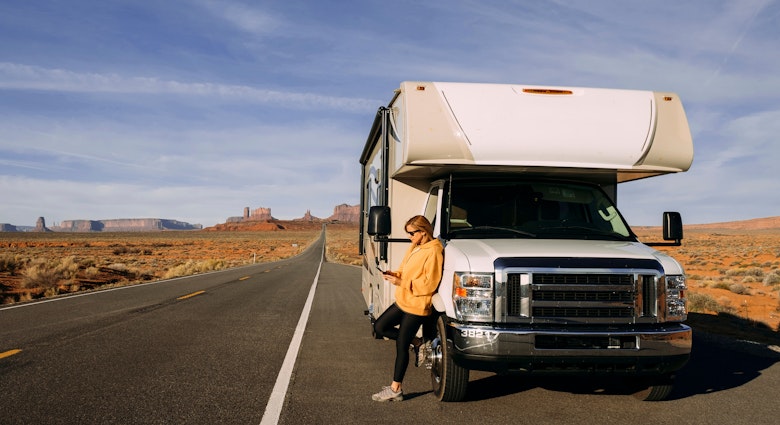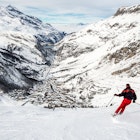
Over my head: Going to the backcountry for a first skiing experience

Dec 4, 2019 • 8 min read

Estes park is known as a great place for summer activities, but it's time to think of it as a winter destination as well © Ben Buckner / Lonely Planet
‘I hope I haven’t made a huge mistake,’ I think to myself as our van winds up the 70-mile road from Denver to the heart of the Rocky Mountains.
I’m on my way to Estes Park, Colorado with a small group of outdoor travel writers to get familiar with a town long known as a hub for summer activities. On this trip we’re going to find out what it offers in winter – specifically, we’re heading into Rocky Mountain National Park to explore its backcountry skiing activities. Only one problem … I’ve never been on skis in my life.

All the other writers have logged dozens of hours on the slopes just this season, and we’re only a couple of weeks in. They’re all very nice, but when they hear I’m an absolute newbie, they’re making noises that sound like they’re quite worried for me. A little background: I’m from the deep south. Growing up, in the rare years we got snow it was only a dusting. I’ve done a lot of camping, hiking, paddling, climbing, spelunking; but whenever a ski trip was suggested my friends and family all had the same reactions: ‘No thank you; not a chance; anything but that.’
On this trip, I’ll be jumping in at the deep end. Not only will I attempt to ski down a mountain, I’m going to ski up one. I’m going to skip the bunny slopes and hit the trails with the pros. I’m going to challenge myself and see what I can do, come what may. As we climb into the mountains, however, I’d be lying if I said I didn’t have some trepidation. The craggy peaks tower above, and I might be in over my head.

We arrive in the quaint mountain town only one day after a government shutdown has ended. That’s great news for the residents, who are intricately connected to the nearby national park. What’s more, there’s been a huge dump of snow in the higher reaches of the park. Spirits are high. I take note of the higher elevation and how it’s affecting me. For many people from closer to sea level, the thin, dry air can be a struggle. You’ve got to drink a lot of water (which staves off headaches) and be aware of your breathing and energy levels.
After we get our gear, we’re going to do some snowshoeing. Tomorrow is for backcountry skiing, and the next day we’ll be splitboarding – this skiing/snowboarding hybrid will be a new experience for everyone in the group. Our first stop is Estes Park Mountain Shop, where the expert rental staff fits us for snowshoes, skis and splitboards. In addition to the rental area, there’s two levels of outdoors equipment for sale, as well as a bike shop, a climbing wall and tons of souvenirs. Some time-saving tips: Get started early, especially if you’re only going to be skiing one day. And fill out your waivers online before you show up.
Afterward we head to a nearby trail for some snowshoeing. In Estes Park you’re never far from a trailhead (or a grazing elk), even if you don’t go all the way into the national park. But while it’s definitely cold today, the snow close to town is only patchy. We’re quickly losing the light, so instead of going higher we opt for a short hike instead. That’s a lesson I’ll learn quickly and often: Be flexible. Weather can easily ruin your plans, but with so many different activities available there’s always something to do.

We get started early the next morning at Colorado Mountain School, the largest climbing operator in the region but also home to world-class skiing instructors and guides. The weather has become worse overnight – the already high winds are even stronger in the upper parts of the national park where we’re heading. These are not safe conditions for being on skis for the first time. I’m disappointed, but it’s ok – I’ll get a chance to go snowshoeing for the first time. Bottom line: the guides are professionals and in charge of everyone’s safety. If they say it’s a bad idea to do something, I’m definitely listening.
At the Bear Lake trailhead parking lot, the wind nearly knocks us over and the snow is piled in deep drifts; it’s only a little better in the trees. Before we get in too far, we check our avalanche beacons. These transceivers, about the size of a Walkman, are essential safety equipment in the backcountry. They broadcast your location to the rest of your group and to rescuers if you’re suddenly buried in snow. Finally, we head up the mountain. My snowshoes are probably a size too small because I’m breaking through the surface a little more than I should, and a couple of times I have to climb out of a shoulder-level hole. But I’m having a blast regardless.
I’m also paying careful attention to what the skiers are doing: kicking their feet forward instead of lifting them, and putting all their weight on one ski or the other, instead of dividing their weight evenly across both skis. In backcountry skiing, you go uphill with the help of ‘skins.’ These are strips of fabric coated in mohair and attached to the bottom of each ski. The tiny hairs allow the skis to glide up the slope when the pressure is off but dig into the snow when your weight is on them so you don’t slide backward.
While I’m the only one with no skiing experience at all, some of the other members of our group are more accustomed to resort skiing and have limited backcountry experience. Still, they’re a match for this mountain, even with the wind. So, if you’re considering a backcountry trip with only ‘inbounds’ experience you should be fine. We spend several hours on the trail, but eventually the wind even gets to the most experienced skiers, and everyone’s happy when the skins come off and we’re going downhill again.

We get going again early the next morning with our next set of guides from Kent Mountain Adventure Center, who will be taking us splitboarding for the first time. This time we’re heading to Hidden Valley – a former ski resort in the national park, established in the 1950’s. The resort struggled under inexperienced ownership and closed in the 90’s but it’s still an ideal place to explore the backcountry. Splitboards are basically snowboards that unlatch and separate in the middle vertically, making two skis. You can put on skins to ski up the mountain, then put the whole thing back together to ’board down.
The weather is gorgeous. The wind has completely stopped and the sun is out, making the trees sparkle, the snow shine and the views across the valley stunning. But we’re also on a steeper trail and going higher than we have on the rest of this trip – well over 9,000 feet – and even before we start, I’m short of breath. This is the moment of truth, though – I’m going to ski up this mountain. We start to climb, and my inexperience is evident. Putting all my weight on one ski or another is an acquired skill that doesn’t come naturally, and it takes all my concentration to keep from dividing the weight and slipping backward.
Despite that, and the frequent stops for deep breaths, I’m not too far behind the rest of the group. I’m also having a ton of fun. Getting out of my comfort zone and exploring this utterly alien terrain is a rush. Having a good attitude in the face of adversity goes a long way when trying something new, and the excellent Kent Mountain guides are a big help, keeping my motivation up and my technique dialed in. Eventually we make it to Trail Ridge Road, the famous ‘highway through the sky’ that connects Estes Park to Grand Lake. It’s closed for the winter, but it makes a great place to put our splitboards back together and snowboard back the way we came.
I’m particularly interested to see how the experienced skiers handle this. Coming in, I thought snowboarding would come naturally to them, but some are struggling with the snowboard more than I expected. Thinking I might finally be on the same level, I’m excited to give this a try. Unfortunately, my body just won’t cooperate. The ascent and altitude wore me out, and despite my best efforts I just can’t muster the energy required to stay vertical on my snowboard. After a half-dozen attempts, it’s clear I’ll be hiking down today, which turns out to be the best decision of the trip. With the pressure off, stomping through the snowdrifts with the shimmering mountains all around is pure joy.

So, what has this experience taught me? For starters, I have no regrets. I set a challenging goal for myself, got out of my comfort zone, and had an amazing time. I met the strong but friendly people of Estes Park whose support and expertise are matched only by their gorgeous surroundings. I learned a lot about the gear and techniques needed for backcountry snow activities. And I learned even experienced skiers can struggle when their feet are locked in place. Most important, I learned my friends and family were wrong – snow sports are amazing. I’m a convert. Next stop: a resort with a bunny slope.
Lonely Planet writer Ben Buckner traveled to Estes Park with assistance from Visit Estes Park. Lonely Planet contributors do not accept freebies in exchange for positive coverage.
Originally published January 2019 and updated December 2019
Explore related stories






 SkiingEverything you need to know about planning a last-minute North American ski trip
SkiingEverything you need to know about planning a last-minute North American ski tripNov 15, 2022 • 6 min read


 Family TravelWhy a mother-daughter adventure will be great for her... and for you
Family TravelWhy a mother-daughter adventure will be great for her... and for youFeb 20, 2020 • 5 min read
